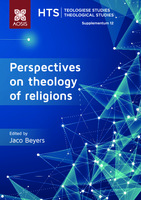Perspectives on theology of religions
| dc.contributor.editor | Beyers, Jaco | |
| dc.date.accessioned | 2017-10-01 23:55:55 | |
| dc.date.accessioned | 2019-04-04 13:38:27 | |
| dc.date.accessioned | 2020-04-01T13:21:57Z | |
| dc.date.available | 2020-04-01T13:21:57Z | |
| dc.date.issued | 2017 | |
| dc.identifier | 640153 | |
| dc.identifier | OCN: 1028014376 | en_US |
| dc.identifier.issn | 2072-8050 | |
| dc.identifier.uri | http://library.oapen.org/handle/20.500.12657/31045 | |
| dc.description.abstract | In the public theology discourse, the concept ‘public square’ has become significant. In today’s multicultural and globalised world it is inevitable that people with different religious affiliations will encounter one another in the public square. ‘Public theology’ cannot but become ‘theology of religions’. Scholars in the field of religion studies are compelled to reflect theologically on the relevance of religiosity in the postmodern secular world. The term ‘theology of religions’ refers to the academic inquiry into the relationship between religions. The collected essays constitute such an inquiry. In the end, it is not so much about the encounter of religions, but rather of people. Religion is no longer regarded as a monolithic body of beliefs and practices. The authors concede that the concept ‘religion’ is too fluid to be delineated precisely. The book’s approach to the relationship between religions, i.e. ‘theology of religions’, reflects how the authors understand the origin and nature of religion (a ‘theology of religion’ in the singular). This book focuses more on ‘theology of religions’ (plural) than on ‘theology of religion’ (singular). The main objective of the book is to present a variety of perspectives on how theology of religions manifested in different contexts. This includes historical (i.e. Luther’s theology of religions and the Roman Catholic position on other religions as taken by Vatican II) as well as cultural and religious perspectives. In the first chapter, the editor gives a brief overview of the development of the discipline of theology of religions. The postmodern era is characterised by an almost non-foundational approach. The second chapter traces the development of the discipline in the Roman Catholic tradition in particular. This contribution is based on the insights of P.J. van der Merwe (1944–2014), who as researcher and Head of the Department of Science of Religion and Missiology at the University of Pretoria, developed a specific theological position on non-Christian religions. A whole generation of theologians was trained in this school of thought. He passed away in 2014 and this publication pays tribute to his life’s work on religions and their relations. The contributions that follow are the culmination of the research of postgraduate students at the University of Pretoria. The third chapter presents a perspective on the Reformation, with a particular focus on Martin Luther. In this year of the quincentenary anniversary of the Reformation the legacy of Reformed belief is highlighted. The fourth chapter describes the relationship between Christianity and Islam from the perspective of a willingness to embrace. The fifth chapter analyses the relation between Christianity, Judaism and Islam from the perspective of intergroup threat theory. A model for theology of religions in a South African context is developed in the sixth and final chapter. This scholarly book pays tribute to the academic contribution of P.J. van der Merwe, mentor of the authors of these multifaceted reflections on theology of religions. The target audience is specialists in the field of religion studies. The distinctive contribution of the book is the innovative perspectives on the relationship between Islam and Christianity in both the Roman Catholic and Protestant contexts. | |
| dc.language | English | |
| dc.relation.ispartofseries | HTS Theological Studies/Teologiese Studies | |
| dc.subject.classification | thema EDItEUR::Q Philosophy and Religion::QR Religion and beliefs | en_US |
| dc.subject.other | dialogue | |
| dc.subject.other | interreligious | |
| dc.subject.other | theology | |
| dc.subject.other | christian | |
| dc.subject.other | threat | |
| dc.subject.other | god | |
| dc.subject.other | jesus | |
| dc.subject.other | africa | |
| dc.subject.other | christians | |
| dc.subject.other | different | |
| dc.subject.other | people | |
| dc.subject.other | muslims | |
| dc.subject.other | love | |
| dc.subject.other | religious | |
| dc.subject.other | salvation | |
| dc.subject.other | religions | |
| dc.subject.other | understanding | |
| dc.subject.other | embrace | |
| dc.subject.other | religion | |
| dc.subject.other | christianity | |
| dc.subject.other | God in Christianity | |
| dc.subject.other | Interfaith dialogue | |
| dc.subject.other | Martin Luther | |
| dc.subject.other | South Africa | |
| dc.title | Perspectives on theology of religions | |
| dc.type | book | |
| oapen.identifier.doi | 10.4102/aosis.2017.hts12 | |
| oapen.relation.isPublishedBy | d7387d49-5f5c-4cd8-8640-ed0a752627b7 | |
| oapen.relation.isFundedBy | a869c2be-5bac-45b6-8178-4777ce39c2c4 | |
| oapen.relation.isbn | 9781928396369 | |
| oapen.imprint | AOSIS | |
| oapen.series.number | Supplementum 12 | |
| oapen.pages | 263 | |
| oapen.place.publication | Durbanville | |
| oapen.remark.public | Relevant Wikipedia pages: Christianity - https://en.wikipedia.org/wiki/Christianity; God - https://en.wikipedia.org/wiki/God; God in Christianity - https://en.wikipedia.org/wiki/God_in_Christianity; Interfaith dialogue - https://en.wikipedia.org/wiki/Interfaith_dialogue; Jesus - https://en.wikipedia.org/wiki/Jesus; Martin Luther - https://en.wikipedia.org/wiki/Martin_Luther; Religion - https://en.wikipedia.org/wiki/Religion; South Africa - https://en.wikipedia.org/wiki/South_Africa; Theology of religions - https://en.wikipedia.org/wiki/Theology_of_religions | |
| oapen.identifier.ocn | 1028014376 |

